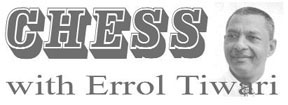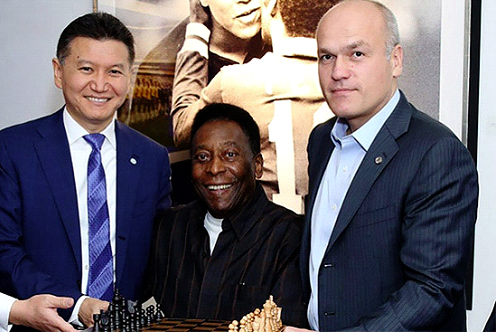During the dutiful protest action to heighten awareness of the persisting, obnoxious Venezuelan claim to Guyana’s territory on Tuesday outside the United Nations in Manhattan, a Guyanese participant expressed the view that President David Granger had in essence checkmated his Venezuelan counterpart following their meeting with the UN Secretary-General. The opinion contains merit, although I would prefer to say Guyana’s president has his counterpart in check, chess-wise. When the International Court of Justice pronounces on the matter in Guyana’s favour, only then would Venezuela have been checkmated. That would be the final solution, when the king is being attacked from all sides and realistically has nowhere to run.
It is interesting to learn that some persons are likening the controversy with its military considerations and foreign policy options, to the game of chess. But technically speaking, chess is a war game, and it’s the oldest surviving war game known to mankind, having been around since 6 AD. The aim of the game is to checkmate the king. Chess adherents increase their problem-solving skills as the game encourages planning and foresight. One underestimates the unparalleled abilities of a chess player at his own peril. One only has to study the moves of grandmasters and generals from the military to realize how differently, and separately, they think, in juxtaposition to ourselves when faced with an exact problem.
 In international chess, the 2015 FIDE World Cup in Baku is all the rage as the competition reaches the finals. One hundred and twenty eight grandmasters had qualified to play the tournament. Now there are two entrants remaining, both Russians, the rest having been eliminated owing to a knockout system. Sergey Karjakin and Peter Svidler are the finalists and they are currently engaging each other to decide a winner. However, both finalists have already qualified to participate in the Candidates, the 2016 elimination tournament set to identify a challenger for world champion Magnus Carlson. Anand, Nakamura and Caruana have also qualified for the Candidates. Interestingly, an extra US$40,000 has been added to the winner’s purse of the World Cup. And breaking news just coming in from Baku, says that Svidler has won the first game from Karjakin. There are others to follow. The tournament ends tomorrow.
In international chess, the 2015 FIDE World Cup in Baku is all the rage as the competition reaches the finals. One hundred and twenty eight grandmasters had qualified to play the tournament. Now there are two entrants remaining, both Russians, the rest having been eliminated owing to a knockout system. Sergey Karjakin and Peter Svidler are the finalists and they are currently engaging each other to decide a winner. However, both finalists have already qualified to participate in the Candidates, the 2016 elimination tournament set to identify a challenger for world champion Magnus Carlson. Anand, Nakamura and Caruana have also qualified for the Candidates. Interestingly, an extra US$40,000 has been added to the winner’s purse of the World Cup. And breaking news just coming in from Baku, says that Svidler has won the first game from Karjakin. There are others to follow. The tournament ends tomorrow.
Recently, President of the World Chess Federation Kirsan Ilyumzhinov met with Pele at the London exhibition, ‘Pelé: Art, Life. Football,’ put on by the Halcyon Gallery to celebrate Pelé’s 75th birthday. Ilyumzhinov is contemplating a run for the Fédération Internationale de Football Association (FIFA) presidency.

Almost 60 years after his World Cup debut and conquest of the title for his country, Brazil, in 1958, Pelé’s name is synonymous with sporting greatness which transcends time and frontiers. On receiving a Kalmyk chess set from Ilyumzhinov, Pelé explained that although he doesn’t play chess very well, he admires the game and what it teaches. It should be noted however, that Pele, immediately prior to each of his games, studied his opponents for about a half of an hour to determine who was stronger with their left or right foot, and place the ball accordingly. He also studied other aspects of their skills. The 1970 Brazilian World Cup team for which Pele was a starter, is believed by many to be the greatest ever fielded in any World Cup.
Chess game
The following games were played at the 2015 FIDE World Cup which ends tomorrow in Baku, Azerbaijan.
White: Pavel Eljanov
Black: Sergey Karjakin
- Nf3 Nf6 2. g3 c5 3. Bg2 Nc6 4. O-O e5 5. e4 Be7 6. Nc3 d6 7. d3 O-O 8. a4 Nb4 9. Nd2 h6 10. Nc4 Bg4 11. Qd2 Bd7 12. Nd1 Re8 13. Nde3 Bf8 14. c3 Nc6 15. f4 exf4 16. gxf4 Be6 17. Qf2 Bxc4 18. Nxc4 d5 19. exd5 Nxd5 20. Bd2 Nf6 21. Qf3 Na5 22. Ne5 Qb6 23. Rab1 Rad8 24. Kh1 Qb3 25. Be1 Qxa4 26. Bh4 Rd6 27. Ra1 Qb5 28. c4 Qa6 29. d4 Rxd4 30. Qc3 Ne4 31. Qxa5 Qxa5 32. Rxa5 Nd2 33. Rd1 Bd6 34. Bf2 Bxe5 35. fxe5 Nxc4 36. Bxd4 Nxa5 37. Bc3 Nc4 38. e6 Rxe6 39. Rd8+ Kh7 40. Bd5 1-0.
White: Wei Yi
Black: Peter Svidler
- b3 e5 2. Bb2 Nc6 3. e3 Nf6 4. Bb5 Bd6 5. Ne2 O-O 6. O-O Re8 7. Ng3 a6 8. Be2 Bf8 9. c4 d5 10. cxd5 Nxd5 11. Nc3 Be6 12. Rc1 Ndb4 13. d3 Qd7 14. a3 Nd5 15. Nce4 a5 16. Ng5 Nb6 17. Nxe6 Qxe6 18. Bg4 Qd6 19. Qc2 Nd5 20. Rfd1 Red8 21. Bf3 g6 22. Ne4 Qe6 23. Nc5 Bxc5 24. Qxc5 Ra6 25. Qc4 Rb6 26. g3 Nde7 27. Qxe6 fxe6 28. b4 axb4 29. axb4 Nd5 30. Bc3 Rd7 31. d4 exd4 32. Bxd4 Rxb4 33. Bc5 Ra4 34. Be2 Ra5 35. e4 Nf6 36. Rxd7 Nxd7 37. Be3 Kf7 38. Rb1 Nd8 39. f4 b6 40. Rd1 Ke7 41. f5 exf5 42. exf5 Nf7 43. Bf4 Nde5 44. Rc1 c6 45. Be3 b5 46. Bc5+ Kf6 47. fxg6 hxg6 48. Rf1+ Ke6 49. Bd1 Ng5 50. Bb3+ Nc4 51. Kg2 Ra8 52. Bb4 Ne4 53. Re1 Kd5 54. Rd1+ Ke5 55. Re1 Kd4 56. Rd1+ Ke3 57. Rc1 c5 58. Re1+ Kd4 59. Rd1+ Ke5 60. Bxc4 bxc4 61. Be1 Ra3 62. Kf1 Ra2 63. Rc1 Kd4 64. Rd1+ Ke3 65. Rc1 Kd3 66. Rd1+ Nd2+ 67. Bxd2 Rxd2 68. Ke1 c3 0-1.
White: Anish Giri
Black: Peter Svidler
- e4 e5 2. Nf3 Nc6 3. Bb5 a6 4. Ba4 Nf6 5. O-O Be7 6. Re1 b5 7. Bb3 O-O 8. c3 d6 9. h3 Bb7 10. d4 Re8 11. Nbd2 exd4 12. cxd4 Nd7 13. Nf1 Na5 14. Bc2 Bf6 15. Rb1 c5 16. d5 Nc4 17. b3 Nce5 18. N3h2 Ng6 19. Ng3 Bc8 20. Rf1 Nb6 21. Ng4 Bxg4 22. hxg4 h6 23. Nf5 Ne7 24. Ne3 b4 25. g3 a5 26. Kg2 a4 27. bxa4 Qd7 28. Qd3 Ng6 29. Nf5 Nxa4 30. Bxa4 Rxa4 31. Rh1 Ne7 32. g5 hxg5 33. Ne3 Rxa2 34. Bd2 Ng6 35. Nf5 Ne5 36. Qe2 g6 37. Nh6+ Kg7 38. Nf5+ Kg8 39. Nh6+ Kg7 40. Nf5+ gxf5 41. Qh5 Ng6 0-1.
White: Sergey Karjakin
Black: Shakhriyar Mamedyarov
- e4 e5 2. Nf3 Nc6 3. Bb5 Nf6 4. d3 d6 5. O-O Be7 6. c3 O-O 7. Re1 a6 8. Ba4 b5 9. Bc2 d5 10. Nbd2 d4 11. h3 Nd7 12. Bb3 Bb7 13. Bd5 dxc3 14. bxc3 Bd6 15. Nb3 Nb6 16. c4 Na4 17. Bd2Qe7 18. Qc2 bxc4 19. dxc4 Bb4 20. Bxc6 Bxc6 21. Bxb4 Qxb4 22. Nxe5 Qd6 23. Nxc6 Qxc6 24. Nd4 Qc5 25. Nb3 Qe5 26. Rad1 Rfe8 27. Re3 Rab8 28. Rd5 Qb2 29. Qxb2 Nxb2 30. c5 Nc4 31. Re2 a5 32. Rd4 a4 33. Rxc4 axb3 34. axb3 Rxb3 35. Rd2 Kf8 36. f3 Rb5 1-0.





